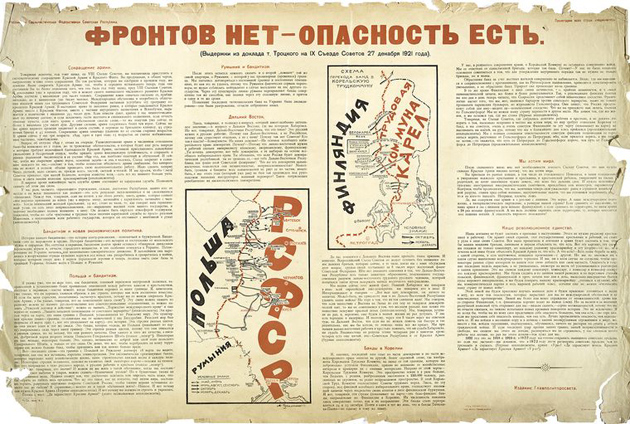
The Bands in Karelia
And, finally, our most recent experience where democracy and international law are concerned is depicted on another, more modest map, where the Karelian Labour Commune is shown, lying to the west of the frontier which we voluntarily granted to Finland, taking its economic interests into account and reconciling them with our own. To the right of this line lies the Karelian Labour Commune. It covers an area twice the size of Belgium, with a sparse, scattered population of about 150,000, spread over a huge, often impassable expanse. In this Karelian Labour Commune the Soviets of the working Karelians rule. Here, on this side, under the fiction of universal suffrage, foreign capital rules, acting through its agents, the Finnish bourgeoisie. And here, comrades, these arrows (pointing to the map) show the White-Finnish bands that were sent from Finland into Karelia. Their numbers and their direction are shown here quite precisely. These bands started to cross into our territory on October 24 and 25 – on almost the very same day as the bands of Tyutyunnyk and Palii, and in fulfilment of one and the same plan.
As a result of the reduction in our army, no troops whatsoever had been left in the Karelian Commune. We had removed the one brigade which was there. Why? We had no reason at all to suspect that even a regiment, let alone a brigade, was needed in those, parts for the maintenance of internal order.
Absolutely no addition to the strength of the bands through volunteering by the local inhabitants has been observed. Everywhere that we have come into contact with the enemy, as in the Rugozero direction, we have noted decrease and not increase in the size of the bands. Their reinforcements come from outside.
Meanwhile. Finland, in the persons of its activists, that is, the extreme chauvinists, grows more and more reckless in what it prints in its chauvinist press. Thus, you can read, day after day now, in the leading Finnish newspapers, that Soviet Russia is insufferable as a neighbour. The phraseology about being a barrier against Soviet barbarism is familiar not only to the rogues of the Paris boulevards but to the journalists of Helsingfors as well. They write that it is for them, do you see, insufferable to have Russia as a neighbour! What do you require us to do, gentlemen from Helsingfors? We cannot transfer our country elsewhere. We live where we live, and we shall stay where we are (stormy applause).
Comrades, at the Congress of Soviets, where delegates of the workers and peasants are assembled, I do not have to say how sincerely and honestly we want peace; but peace demands that Karelia be cleared of the bands, and we advise Finland, advise her very strongly, not to put an elbow or a hand over that line (pointing to the map) because we are going to pass along there in the next few days (prolonged applause). With full awareness of our responsibility we advise the Finnish commanders not to be in any hurry to measure the distance between Helsingfors and Petrograd, because, if it should come to measuring that distance – and we do not want to do this – it may turn out that the road from Petrograd to Helsingfors is shorter than the road from Helsingfors to Petrograd (prolonged applause).